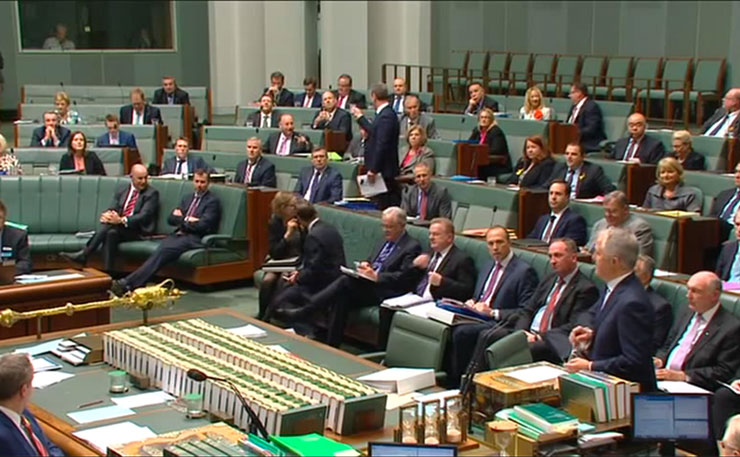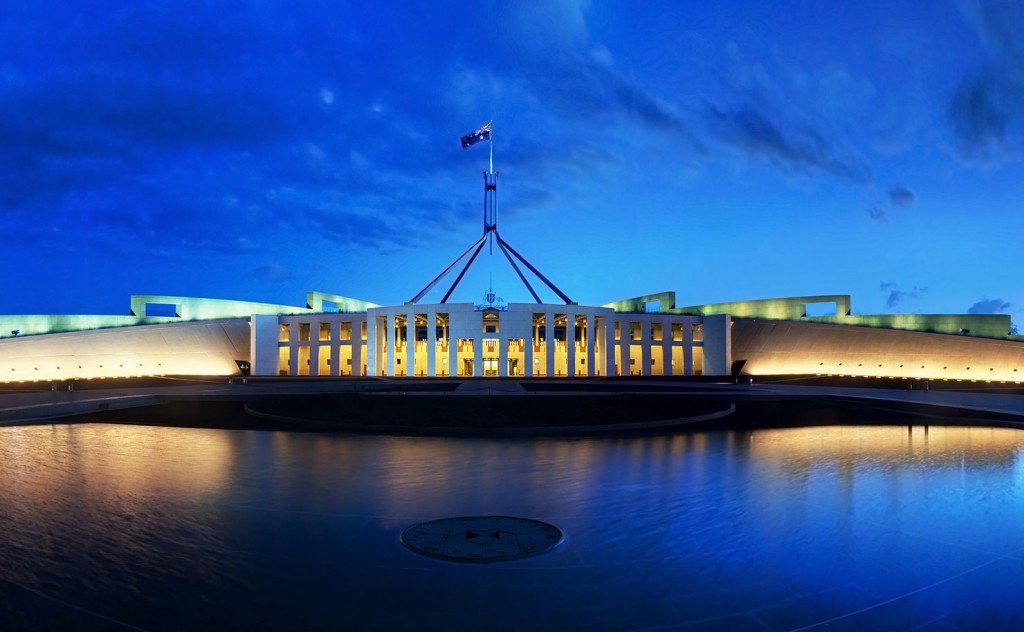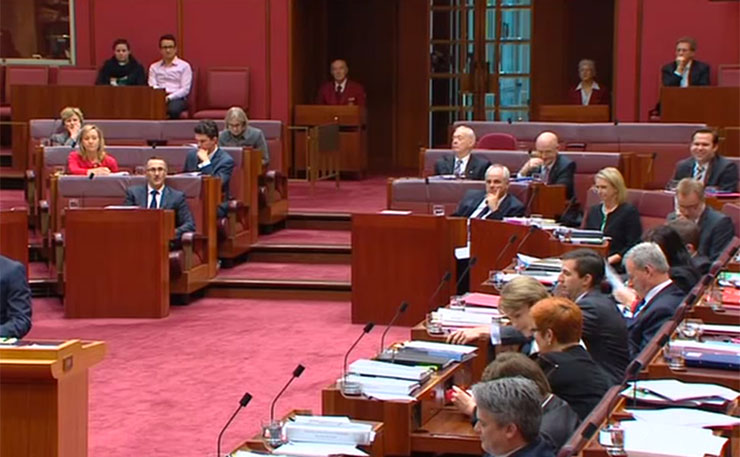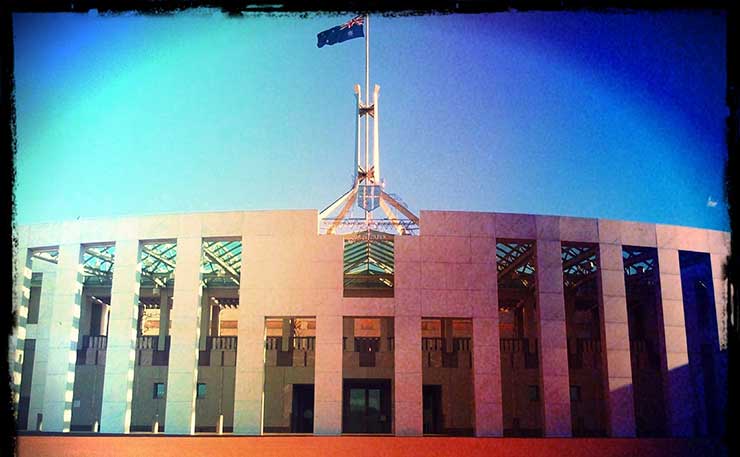The system is broken, and more of the same is not going to fix it. Paul Spinks puts forward some ideas for a democratic revolution.
Democracy in Australia offers little real individual power. We have the right to vote in elections, but from then on decisions are made by the parliamentary few who are, in turn, influenced by agendas, vested interests, party donors and lobby groups.
Even when a politician’s intentions are good they usually play second or third fiddle to party machinations and political pressures. Money generally rules and the vast majority of us don’t have enough of that to buy influence, though occasionally we become collective squeaky wheels through protest. Essentially, we have trickle-down democracy and, similar to its economic counterpart, precious little reaches the bottom.
This basic right to vote in elections didn’t happen overnight, either. We went from tribal rule to being controlled by benign and despotic kings (and queens), emperors and dictators, flirted with democracy, even papal reign until the emergence of parliamentary democracy.
Our present Westminster privilege resulted as part of a progression, part of incremental change and reform (and to curtail some excesses of the above), but it was a democratic baby step, a beginning, not an end. We aren’t far enough removed from dictators and despots to feel safe a return to those days is beyond us.
Australia, for example, has and is being lead down a path that many, if not the majority disagree with, but we still end up with governments taking us along the same route, and we feel powerless to prevent it.

There’s a sense democracy is actually going backwards; a belief that Australia isn’t as egalitarian as it used to be. Trade unions, for example, have been significantly neutered, diminishing one representative voice, while those hawking the free market have arguably grown louder, and it has become harder to distinguish between the major political parties despite their sandpit adversarial stances.
Representation imbalances have given rise to grass-roots protest groups, such as GetUp, and invited political independents and micro parties to fill a void. Poor governance has often resulted in ill thought-through programs frequently exploited due to insufficient oversight and, in the process, increased public frustration. A more cynical view suggests that so many pollies have half an eye on post-political tenure, how can they possibly represent us adequately while in office?
I believe that Australians (people in general) will make the right decisions when provided enough information – or at least a majority will. The people are often ahead of governments on many issues. In my opinion, if matters like climate change had been decided by ‘the people’, concerted action would’ve begun many years ago.
That said, in the absence of education and knowledge, too many of us are still impressionable to shrill headlines, sensationalism, trivia, slogans and scare campaigns, which are, in turn, also controlled by the select few and devalue the voting right.
So, how do we increase democratic participation and, as a by-product, improve fairness? How do we encourage the democracy baby to walk?
In considering this I began by exploring how the internet could be a means, via electronic voting, for ongoing participation beyond a solitary election vote. While there are cost, and security and anonymity issues to consider, that’s insufficient reason to dismiss the medium: internet voting is already practiced for elections in some places.
The 2016 Census is a recent Australian example of the internet being used for democratic purposes. Much was made of the cyber attack that denied access, but ultimately the collection was successful and no data was lost. It wasn’t hacked, as some reports implied, and problems could’ve been avoided.
Interestingly, the online information was considered ‘higher quality’ because people were more responsive via that medium. That means internet voting per se will feasibly result in more informed and conscientious participation.
In any case, risks are associated with current voting practices – ballot papers occasionally go missing, dead citizens sometimes vote, not to mention the previously raised matter of economic, power and information inequity corrupting outcomes.
In a regular electronic voting scenario, parliament of the people for the people can also be with the people. There could effectively be three levels of Federal government – the House of Representatives, the Senate, and the people as the Third House.
Naturally, many questions would need to be answered. Should, for example, participation be compulsory? If non-compulsory to what extent would we allow persuasion in the form of political advertising etc? Could participation, to begin with, just be about contentious issues both houses have failed to pass? Or should there be a set number of major polices following each election? Might it be on every item? Should results be binding or non-binding?
In my opinion there’s not much point unless it’s binding in a meaningful way, but there could be an initial period where governments only need consider the public vote. The very act of people having more power will likely have politicians taking additional heed anyway. It could be trialled at Local or State Government level where population numbers are more manageable and issues generally less divisive. Ultimately the people could also have the right to move motions and have them debated by parliament (if, say, an issue is petitioned for by a certain percentage of the eligible population).
The Turnbull government wants us to vote about marriage equality via a plebiscite. This can be turned around by arguing the Government, in that case, can also allow a vote on other contentious matters and that electronic voting provides a possible, cost-effective medium (with, of course, alternative methods provided for those lacking internet access).

The Australian Electoral Commission website is the obvious forum. Items could be presented as a step-by-step process – first the pros and cons of the particular issue are provided, perhaps followed by a knowledge test with multiple choice answers, and the voter acknowledges that he or she has made themselves aware of the arguments and is now ready to cast a vote.
The process of voting would probably make people more responsible anyway, especially if reminded they’re about to participate in a matter important to the national interest.
It can coincide with education that reinforces notions of citizenship, its rights and responsibilities, but done so that people embrace it. Participation is power! And ownership! Students, for instance could earn their political ‘P plates’ as part of the school curriculum: a democratic right-of-passage. Perhaps there might be a form of national service and/or boot camps where combat training is replaced by political learning – arm citizens with knowledge rather than weapons – the pen is, after all, mightier than the sword… and so is the mind.
Electronic voting can work alongside other democratic initiatives. The New Democracy Foundation (NDF) is a research organisation formed to promote a citizens’ jury system of participation: randomly selected, similar to court juries, but deliberating on political policy, they’ve been successfully used by some state and local governments.
Executive Director, Iain Walker says, “(The problem) is not politicians, but a system which has become excessively responsive to uninformed public opinion…. When it comes to internet voting, we are gently in favour to the extent that the act of voting could become more deliberative…. The security issues are non-issues in a world where we trust credit cards and buying online.”
The Spring 2015 edition of Meanjin magazine was devoted to examining the current state of Australian democracy. Views encompassed a broad spectrum, but a recurring theme among contributors was of democracy being at the crossroads (interestingly, Clive Palmer wrote a piece on career politicians, which is better reasoned than some may imagine).
Gwilym Croucher, senior lecturer, Melbourne Centre for the Study of Higher Education, echoed aspects of my proposal (or vice versa) by touching on the need for a “compulsory democratic duty” and that it can be aided by technology (i.e. the internet).
A common suggestion for reform, however, was a citizens’ jury system. New democracy is the general term. Though, what’s old is new again, as Luca Belgiorno-Nettis (founder of the NDF) revealed its origins date back to Ancient Athens.
Former West Australian pollie, Geoff Gallop, referred to them as mini-publics replicating the population at large. Inevitably they reveal people are intelligent and conscientious when given the opportunity to contribute, and that the wider public is more accepting of a deliberation made by peers unencumbered with vested interests.
Australia was a world leader in democratic reform during two periods prior to, and at, Federation. Nicholas Reece, principal fellow at Melbourne University, referred to historian Manning Clark’s description of them as Australia’s first two bites at democracy. Reece decried the lack of progress since and suggested the current crisis of confidence might lead to a third bite with citizen juries the most promising option.
Meanjin aside, a Citizens’ Senate takes the jury idea much further. In this scenario, randomly selected members of the public serve a 12-month stint, replacing the current elected senate (removing the need for another layer of cost and debate). That would likely be much harder to implement given it requires politicians to relinquish roles. A citizens’ senate that compliments the House of Reps and the Upper House with aims to gradually phase out the latter could be a more feasible option.

The biggest obstacle to any democratic reform, apart from opposition by vested interest and defenders of the status quo, is likely to be apathy, and overcoming that could equally depend on incumbent political elites supporting change or being persuaded to.
There are risks (and costs), but they exist with the current state of play – the narrow, moneyed view of progress, and the growth-for-growth-sake mantra eroding individual political influence, economic equality, the environment and quality of life.
Governments now often fail to represent the people’s best interests, except by vague ideas of what’s good for the economy is good for the people (when the reverse should be emphasised). And there are reforms governments just can’t implement on their own, even when they want to.
Tony Abbott declaring Australia “open for business” immediately following his election as Prime Minister says much about current political priorities; and Labor long-ago sacrificed principles on the pillar of electoral expediency. Our governments often lack vision; business frequently lacks imagination. Short-termism rules the day.
Economic rationalism still dominates our political scene. Extreme capitalism has hardly become less so since the global financial crisis despite talk at the time that it needed curtailing. Financial reform then was hardly given more than lip service, and any regulation will inevitably be loosened before we spiral into the next cycle that could end even more catastrophically than the last.
Globalisation, population growth and technological advances have extended horizons while diffusing individual sense of identity and influence. The internet has contributed to this, but it can also shrink the world, bring us closer together and help decentralise the decision-making process.
Australia was given a rare and special privilege – a clean slate to develop by learning from the mistakes of other nations. Instead we often seem hell-bent on repeating them.
We’re a developed nation making decisions like an undeveloped one, hocking resources and sovereignty with disquieting eagerness.
A Big Australia is seemingly being imposed whether wanted or not, with none of the main parties brave enough to have a policy on population growth, for instance. Even the Greens are mute on theirs.
Automation is another factor to face sooner rather than later – how will people be employed in future, how can we prevent it increasing the wealth divide?
These are among many matters, big and small, needing community consideration and deliberation rather, than be driven by vested interests, political whim or simply left to the market.
Technological advances provide the opportunity to take democracy to the next level by allowing all citizens an increased say. Some will say we can’t afford to, I will say we can’t afford not to.
My original proposal of internet voting as a universal, customary activity with the people as a Third House may currently be a leap too far. However, citizens’ juries and senates, supported by the internet as an agenda setting tool with regular referendum-type electronic voting are realistic next steps.
In the aforementioned Meanjin, the Australian Collaboration (an independent network of national community organisations) lamented that community groups do much of the consultation and research for democratic innovation with little help from government.
We can’t rely on politicians to introduce meaningful democratic reforms without us pressuring them to do so, and the internet can provide a forum for that advocacy as well. According to Iain Walker, “The overarching message remains that innovation in democracy is achievable and that reform options exist which can be trialled in a fairly simple way.”
It won’t be perfect – it isn’t a cure-all – some will attempt to exploit it. But it will be far more representative than the present state of affairs and can be an essential forum for common-sense deliberation.
Some might rightly claim Australian democracy has come a long way, baby. But it’s time for it to take the next step and get up and walk.
Donate To New Matilda
New Matilda is a small, independent media outlet. We survive through reader contributions, and never losing a lawsuit. If you got something from this article, giving something back helps us to continue speaking truth to power. Every little bit counts.





